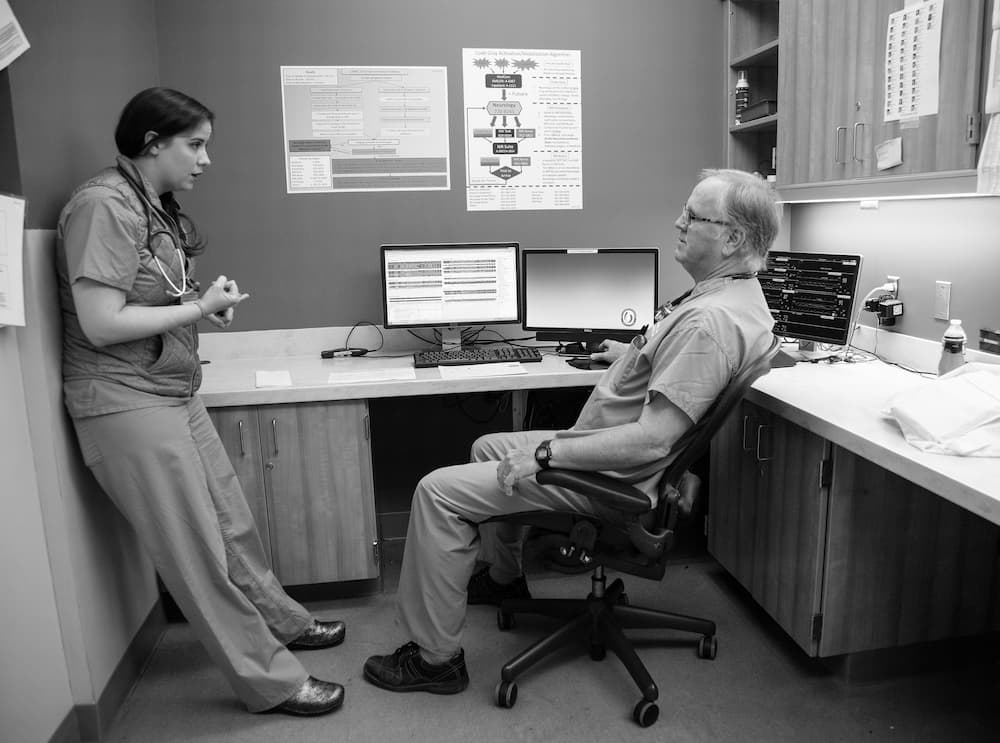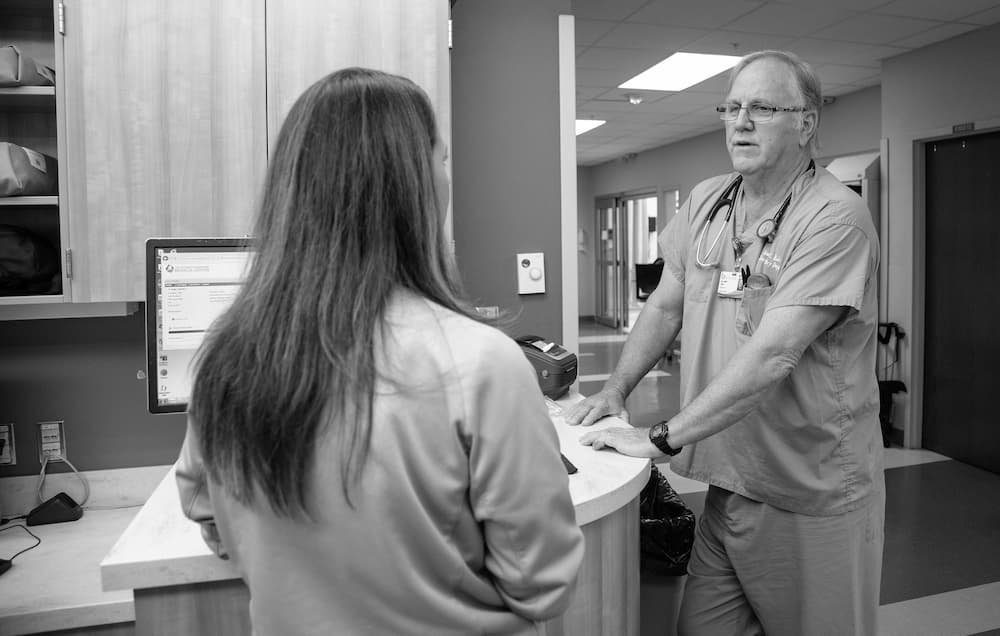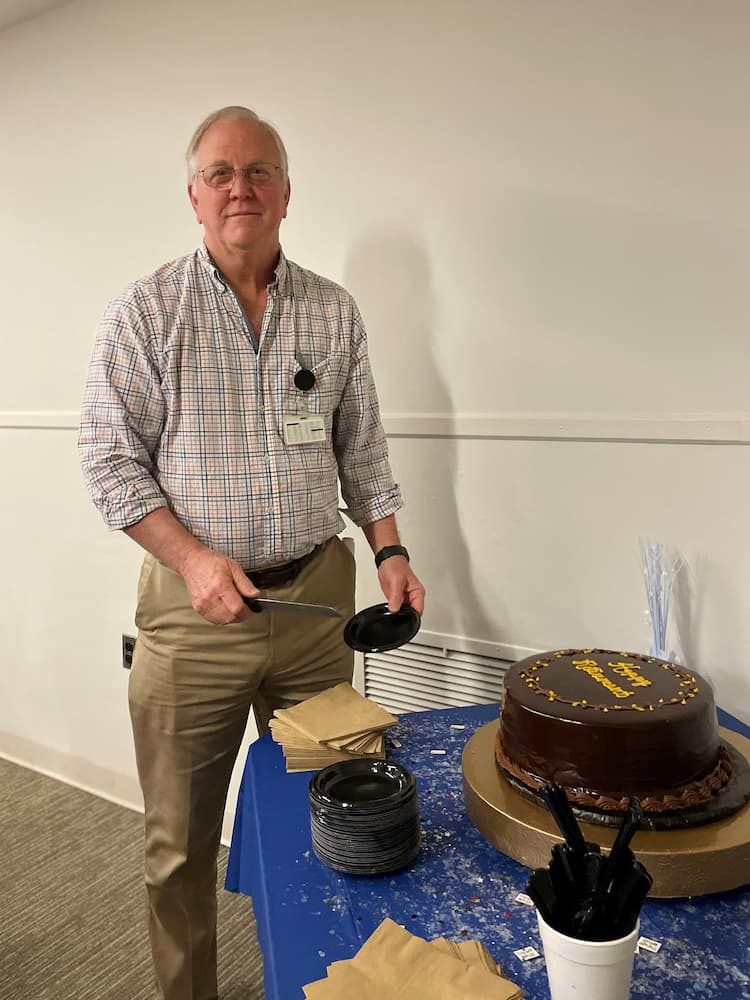Dr. Jimmy Kolb retiring after 28 years at the University
What are the biggest ways the ED has changed during your time here?

Two main categories that come to mind are: 1) medicine itself and the role of imaging and 2) acceptance of emergency medicine in the institution and the progress of the institution. Here’s a hodgepodge of random things that come to mind.
Changes in medicine: The main one that immediately comes to mind has been the role of imaging. Appendicitis used to be a clinical diagnosis, and one of our surgeons laughed it off when I showed him a paper in the NEJM saying they could diagnose it with imaging. We had a journal club with residents where we were reviewing papers claiming they could assess trauma and diagnose liver, spleen, and other injuries with CT scan instead of doing the routine peritoneal lavage or doing exploratory surgery. To get a CT scan of the head at night, you had to get permission of the radiology resident to have a technician come in from home. Part of what led to availability of CT at night was stroke care with the need for emergent CT before consideration of thrombolytics in stroke. Then we went through the same thing with CTA for pulmonary embolus. Prior to then we got V/Q scans, and these were “indeterminate” most of the time and so we had to decide whether to get a formal arteriogram with placement of catheter in the pulmonary artery. DVTs were diagnosed with venogram until some crazy radiologists came along saying you could diagnose it with compression sonography.
The ED started to play more of a role in MIs when lytics became treatment for MI with treatment needed as quickly as possible. We had to push for the “right” to use paralytics for intubation and later for the use of ketamine, as everybody knew these were drugs only anesthesiologists should use. There have been many advancements in airway management, going from nasotracheal intubation to intubating over the bronchoscope to using paralytics to more advanced devices and with glidescope-like devices. We had to push to adopt limited sonography, and more recently the use of echo, as specialists outside our field did not feel we should do this. We used to do much more gyn and OB.
One of the largest changes is the advanced prehospital care patients now receive with some of our more advanced providers capable of almost anything we would do in the ER. Prior to Bob Jorden, who not only started the residency here, but also a paramedics training program, it was not uncommon for patients to arrive in the back of a car or have trauma cases literally dumped in front of the ER. Our Department was one of the earliest to implement telemedicine and also computerized charting at this institution (way prior to EPIC).
What about UMMC as a whole?
As far as changes in our role and function in the institution as a whole, we have become much larger and also a kinder, gentler, and nicer place to work and interact. We even have offices that are not across from the waiting room’s bathroom, or in a trailer, and we have our own floor and offices for researchers. Over the years emergency medicine has become much more relevant to the institution. We went from an initial four residents (one of which dropped out) in 1986 to now having forty-seven today, one of the largest programs in the country.
Emergency medicine is now accepted as a specialty. Early days there was much more having to advocate for our residents and faculty, having to confront demeaning attitudes from other services who at times looked down on emergency medicine and denigrated it. Fortunately, it is rare today that you have to stand up for emergency medicine against unprofessional behavior, as the institution as a whole has become much more professional and understanding of the role of emergency medicine. We went from being the unwanted stepchild of the internal medicine department to being our own department that is well supported and has been well supported since becoming a department. Paradoxically, over-crowding may have helped relations with other attendings and services since most healthcare providers now know where the ER is located and understand the situation better instead of trying to make it all an “ER problem.”
We have been lucky in that each Chair of the department has incrementally advanced the department and navigated through hard times. One of the largest advancements for EM has been the role of healthcare providers in the highest leadership roles in the institution who came from emergency medicine and really understand how things work and are used to making hard decision with incomplete data and are incredibly well organized. The communication from leadership at the institutional level to leadership at the departmental level has improved greatly.
Unlike some other departments we have always had leadership that is clinically involved, as is currently the case. Our interactions with other departments have worked best when Chairs of our department and other departments are still active in seeing patients.
What advice would you give EM physicians starting out today?
Here are a few thoughts:
- It’s now much easier to keep up life-long learning in emergency medicine – you don’t have to go find books in the library and look up things in card catalogues. You have podcasts, google, etc. Do it even if in private practice. Push yourself to learn new skills, but research and learn it well before trying to apply it.
- GPT notwithstanding, take time to learn to read and write well. Not having this skill can/will hamstring you for much of life.
- I have no idea what the future holds as far as AI goes.
- Most things about personal wellbeing, residents are more aware of and are now even taught in training:
- Reset from time to time and remember the privilege to be in such an interesting and challenging field. A grateful attitude is really helpful to mental health.
- Remind yourself it’s about the good of the patient.
- Although facts matter, what is just as important, or more important, is how patients feel.
- Take time for your family. What we do is important and at times gratifying, but ultimately when you are gone even the most powerful and famous are quickly forgotten, but your family time is not forgotten. (Most who currently work here do not know who the people are with names on the buildings or giant pictures in the hallway.)
- Do a better job than I on cultivating an outside hobby.
- Routinely give a portion of your income to the less fortunate.

There is no one highlight. Just of bunch of gratifying gradual wins among the occasional hurts and disappointments over the years. I have had the privilege of interacting with many really smart people who challenge you and from whom you learn.
The most gratifying thing to me is to look at the pictures of all of the residents that have come through here and moved on to help different parts of the US. I know I learned at least one pearl from each resident. Some were knowledge gaps for me and others were questions that I had never thought about. Truly some “stupid” questions that have been presented from residents and students have actually been pearls when you reconsider them carefully. I estimate the number of residents I’ve worked with to be nearly 250.
We don’t have pictures of all the faculty through the years, but I am grateful for all from whom I have learned so much over the years. But in recent years particularly the informal conversations with Brian Tollefson, Nick Hoda, John P Sandifer, Kendall McKenzie, and Richard Summers.
I am grateful to all who have enriched my time here, both current and prior residents and fellow faculty.
What are you looking forward to in retirement?
I have surprisingly little in the way of organized plans. I’m sure that I have not prepared as well as I should/could have. The current generation will do much better with this and life/work balance. I hope to:
- Spend more time with my children.
- Perhaps read more on cognitive science and how brain neurons are able to create mind, a long-time interest even before Francis Crick make this his main area of research in his later years.
- Sleep a full night.
- Have an exercise routine.
- I was 16 or 17 when I did my last painting. Not sure that’s an option, but some find satisfaction in painting as they become elderly and less rushed.
If you have memories or thoughts that you'd like to share with Dr. Kolb, email us at UMMC-EmergencyMedicine@umc.edu and we'll make sure he gets them.



